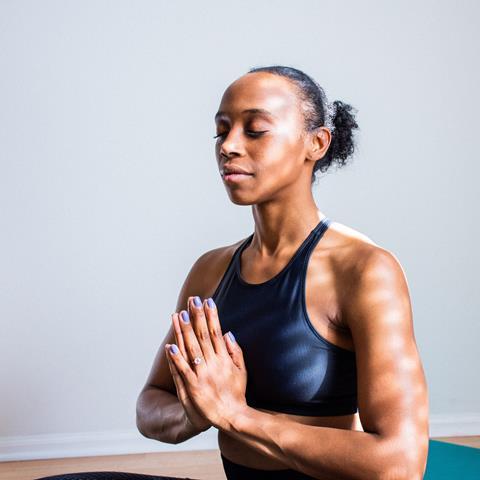Yoga is a contentious issue amongst Christians - is it ok or does it open us up to demonic influences connected to the exercise? Olivia Shone has done her research, and here are her findings.

Yoga is a big issue for some Christians, but for others it’s no big deal. It has been a big deal for me personally as I have seriously questioned, prayed and considered it whilst also discerningly practising it over the last twelve years. There are those who don’t touch yoga and it is a personal decision on which the Bible offers no clear guidelines. However, I have found slow mindful movement (which is largely how I see modern postural yoga) to be beneficial for my body and my mental health and also for my spiritual life.
My own foray into practising yoga came when my regular exercise teacher announced she was bringing some yoga postures into our classes. I prayed for protection and discernment and barely noticed anything different to the usual routines.
Western Christianity has largely forgotten the body in its pursuit of God
Some years later after experiencing burnout from looking after four young children as my husband recovered from a brain tumour and subsequent blindness, my regular running no longer held the same appeal. My body was tired and I wanted to go slow but I still wanted to exercise so I started practising ‘Christian yoga’ online.
People have asked me why I don’t practice other exercise forms instead. Most exercise forms including Pilates foreground exercise so that the primary goal is to service the body as though it were primarily just a vehicle that drives our heart-mind-soul around.
But our body is part of who we are; our being includes our body. The scientific research illustrates just how connected our bodies are to our heart-soul-mind as Bessel Van Der Kolk writes in The Body Keeps the Score. Western Christianity has largely forgotten the body in its pursuit of God, even disdaining the body (adopting Hellenistic and Enlightenment thinking) and yet Christianity gives us an incarnate God and bodily resurrection. The body matters and we need to encourage Christian spirituality that is embodied and holistic. Modern yoga can offer us a way.
Whilst yoga originated in the East, modern postural yoga is a far cry from the yoga taught by ancient yogic teachers where asana (postures) were only one of the eight limbs of yoga. Modern yoga is more concerned with postures than traditional yoga schools ever were and has itself borrowed hugely from Pilates, body-building, dance and calisthenics and is very often detached from any Eastern spiritual referencing (though not always).
Whilst yoga originated in the East, modern postural yoga is a far cry from the yoga taught by ancient yogic teachers where asana (postures) were only one of the eight limbs of yoga.
Modern exercise classes borrow yoga postures and so the two-way evolution has been huge, to the point that there is no agreed on definition of yoga today. The majority of yoga postures evolved in the twentieth century and, contrary to some beliefs, were not designed to worship Hindu deities. There is also a superstitious belief among Christians that certain postures somehow belong only to yoga and therefore have spiritually negative attachments. Surely our body and its postures belong to us and to God and we can choose to use our bodies to glorify God. Paul was convinced that ‘there is nothing unclean in itself’ and the body and its positions are therefore clean.
However, this is not to say all yoga is beneficial for Christians. Some yoga teachers invite practitioners to participate in Eastern spiritual practices as found in Kundalini yoga which I personally wouldn’t want to practice. There are some people who have been drawn into a spiritually enslaving experience of yoga whilst others find they become overly committed and it becomes like a religion. Some teachers can teach yoga as a holistic ‘lifestyle’ which might compromise our commitment to Jesus as Lord.
As Christians we have the Holy Spirit who helps us discern how to navigate these things just as we need to exercise caution around things like alcohol, viewing films, and dating, all of which can open us up to spiritual and bodily enslavement.
Read more on exercise
Fitness and faith help my neurodivergent brain
‘I can get you a six-pack, but I’m far more interested in getting you into heaven!’
I suggest we use discernment in our engagement with modern yoga just as Paul adopted and adapted aspects of Greco-Roman philosophy and used its infrastructure for mission. Just because there are cautions doesn’t mean the baby needs to be thrown out with the bathwater.
Yoga means ‘to unite/yoke’ and I have found a greater connection between all aspects of my being, body-mind-soul, so that I feel more connected to myself, more grounded, more whole. It’s improved my wellbeing enormously and I get a strong and flexible body as well. However, I also find myself more connected to God’s peace and presence during and after practice. I can use my bodily postures to pray to God without words. In a ‘Forward Fold’ or ‘Child’s Pose’ I’m able to surrender my burdens to the Lord not only through intention but physically. A ‘Reaching Chair Pose’ enables me to express my need of God, whilst a strengthening ‘Warrior Pose’ allows me to open up to the strength God gives me. Postures can offer a way of praying when we don’t just want to use words. Postural practice can leave us feeling more grounded and whole so that we are better able to read scripture, meditate and pray.
Modern yoga is present and popular and yet the Eastern spiritual trimmings are optional and avoidable with discernment. The benefits to physical and mental wellbeing are well researched and I personally have known them. The goal isn’t to push the boundaries and get away with tasting forbidden fruit but rather to explore and experience the innate and God-given benefits of a body-mind-soul connection. I personally have a peace that I can use modern postural yoga to enhance my spiritual life but each of us needs to explore this emerging field prayerfully for ourselves.
For a more thorough discussion read this essay
For Christians new to yoga and wanting to give it a go, here are some suggestions: Maranathayoga, Crossyoga, Caroline Williams and YogaFaith or for a safe and secular version Yoga with Adriene.
Rie at Crossyoga also offers online classes, trainings and a conversation on 6 Jan 2024 at www.crossyoga.org
Listen to the WA podcast episode: Yoga for Lent? On Premier Plus, Apple Podcasts, Spotify or wherever you get your podcasts.
































3 Readers' comments